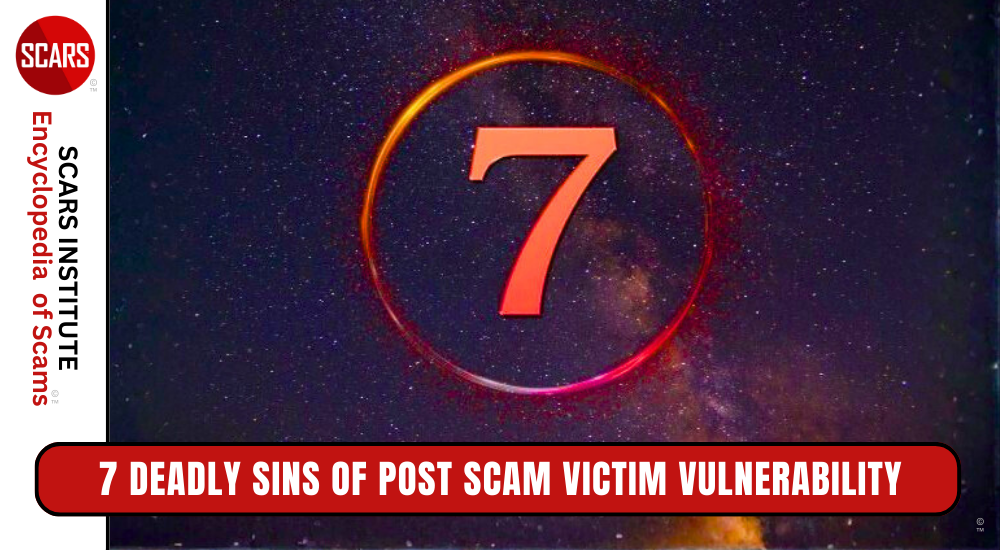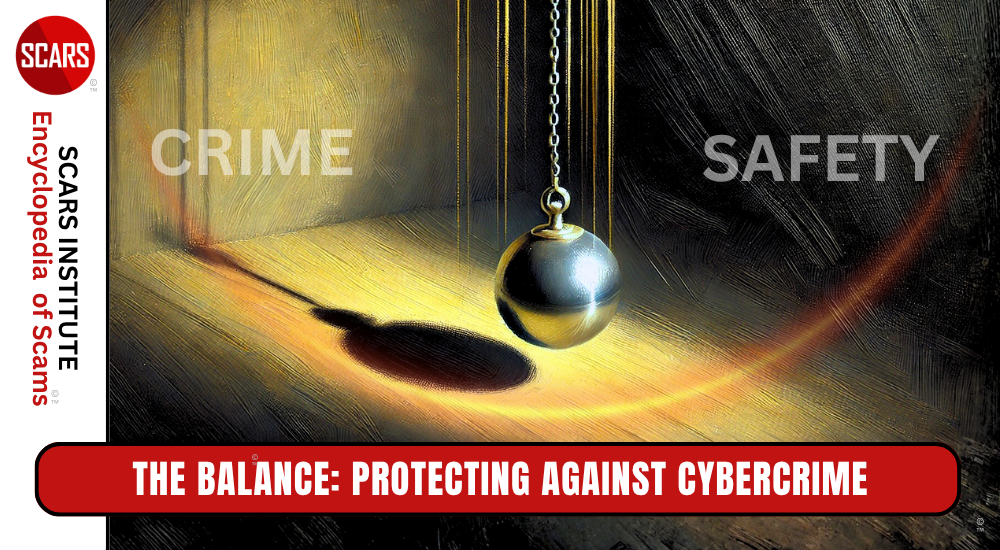
SCARS Institute’s Encyclopedia of Scams™ Published Continuously for 25 Years

In A Landmark Case Against A Scam Victim, They Have Obtained A Conviction!
As We Have Predicted For Several Years, The U.S. Government Has Lost Patience With Scam Victims.
If a scam victim does not report the crime, then potentially, in the eyes of the law they may be also guilty of one or more crimes.
We are presenting this to help you (a scam victim) fully understand the potential consequences of not reporting or hiding these crimes. You may be ashamed and afraid of judgment, but you have to report these crimes to identify yourself as a scam victim, a victim of a crime!
Let’s Explore Basic Facts
First, let us explain that this does not apply to investment scams, where a scam victim believes that are making an investment. This applies to victims, typically in a romance scam or other relationship scam.
In most romance scam situations, a scam victim engages in their own deception of family and friends, banks and financial institutions, and other government entities. What we mean by that is that while under the control of the criminals, the scam victim often tells lies about their relationship.
What kinds of deceptions are victims engaged in?
Remember this is not all scam victims – but many!
- Often deceiving family and friends about the relationship, and often to obtain additional money to send the scammers. This is fraud. Also, scammers ask the victim to engage in spreading a story that will turn out not to be true.
- Bank Fraud – most victims that send money to a scammer misrepresent the nature, purpose, or reason for the bank wire transfers.
- Wire Fraud – many scam victims, especially those in heavy denials will communicate via email, text, and phone details about the relationship that are not true.
- When the police come or speak with scam victims in denial, they often make false statements to the police, even though the police tell them they are in a scam.
- Those victims that receive money on behalf of a scammer, even if they do not know it is a scam, are often receiving stolen property, doing money laundering, and engaging in obstruction of justice (perverting the course of justice).
- Many times victims give access to their financial accounts, such as credit cards, bank accounts, etc. These are also forms of fraud.
- Refusing to report these crimes can make a victim an accessory to the crimes as well.
In essence, the average victim that sends money to criminals is probably engaged in one or more of these crimes. They probably did not know it was a scam unti the very end, but it is especially challenging when they were told it was a scam and did not listen – something very common with scam victims.
Are They Really Victims?
We tell every scam victim that it is necessary to report the crime to their local police so that there is a record of the crime!
We tell victims that the most important aspect of this is for the victims to retake control away from the scammers, but there is also another important purpose – declaring themselves as victims.
If a victim hides the crime, then they may not be considered a scam victim and instead, can be considered an accessory to the crime – this is aiding and abetting the criminals. There have already been several arrests and convictions of victims accused of being money mules who have been convicted.
So the simple reality is that if a victim refuses to properly report these crimes, they place themselves in legal jeopardy.
The Scam Victim Case That Changes Things:
This is the story of a scam victim who lied to family and friends, and to the Federal Authorities. This is clearly the case of a scam victim in deep denial, but it resulted in a conviction.
Woman (Scam Victim) Who Lied About A Romance Scam Sentenced to 2 Years in Prison
U.S. District Judge Sarah E, Pitlyk on February 16th, 2023 sentenced a woman from Ohio who lied to U.S. Postal Inspectors to conceal her involvement with romance scammers to two years in prison.
On April 29, 2020, U.S. Postal Inspectors found $50,000 that had fallen from an Express Mail package sent by Linda Matson, now 62, of Xenia, Ohio to a post office box being used in a romance fraud gang. They later found a second package containing the same amount.
The inspectors reached out to Matson, who acknowledged that she had been scammed by someone claiming to be a lieutenant general in the U.S. Army.
This is a common occurrence with scam victims that are in deep denial and firmly under the control of their scammers.
On May 10, 2020, three days after admitting she had been duped in that romance scam, Matson began inducing her relatives to send her money on behalf of her fictitious military officer.
In an effort to conceal her continued involvement in the romance fraud scam and to expedite the return of the seized funds, on May 18, 2020 she sent multiple text messages to a postal inspector falsely claiming that she needed the money to buy posters and T-shirts to help find her missing 18-year-old niece. Matson also sent links to news articles and Facebook stories about a missing Ohio teenager to deceive the inspector into acting quickly.
This appears to have been a story created by the scammers so that the victim could get the money back and send it to the scammers. SCARS has seen this exact kind of behavior many times before.
Believing Matson’s statements to be true, between June 1, 2020 and August 3, 2020 relatives gave Matson $590,000 that was to be used to help the fictitious military officer obtain an imaginary portfolio containing cash and diamonds valued at $20,000,000. Instead of providing the funds to the United States Customs Service as she promised, Matson mailed the money to post office boxes controlled by the romance scammers.
Matson pleaded guilty in August to a charge of making false statements to a federal agent and admitted she intended to use the money for reasons she was concealing from the postal inspector. She also admitted lying to the inspector and the FBI.
Unfortunately for this victim, these are all crimes that the government takes very seriously.
In a related case, Bonmene Sibe and Ovuoke Frank Ofikoro pleaded guilty to conspiracy to commit a mail fraud and wire fraud scheme that used the same false claims about military officers to deceive women into mailing $844,070 to post office boxes in St. Louis. Judge Pitlyk sentenced Sibe, 43, to five years and three months in prison in May and Ofikoro, 43, to four years and two months in prison in June. Both men were also ordered to repay their victims.
The U.S. Postal Inspection service and the FBI investigated the case. Assistant U.S. Attorney Tracy Berry is prosecuting the case.
What Can Be Learned From This Case?
The tolerance for undeclared victims in denial is gone. If a victim knows they are being scammed, or discovers it and does not stop they may be subject to arrest and conviction.
However, as we have seen in case after case now, one of the most critical elements of this is the victim’s willingness to come forward and properly report these crimes
Another Case:
A “romance scam” cost a Tennesse woman nearly $34,000 and now a Gilbert woman is facing fraud charges. Officers arrested 70-year-old Carla Ann Whaley at her home on Monday afternoon.
According to court paperwork, the woman told police in late November she believed she was talking to a man named “Garth Davis” on the popular Words With Friends gaming app. The victim told officers she was lonely after her husband had died earlier that year. She told police she began talking with “Garth” in March 2021 on Google Hangouts when she started sending him cash cards and gift cards when he told her he was having trouble accessing his bank account. When she broke her foot and couldn’t leave her home to go to the store and buy the cards, “Garth” told her to start sending money to Whaley, who he said was his friend.
The woman sent Whaley $20,000 in cash and $3,000 through CashApp until July 2021. The woman grew suspicious and called the police shortly afterward, who went to Whaley’s home to speak with her. According to court paperwork, Whaley told police the name “Garth Davis” was familiar to her, but it was “not on her list.” Court documents state that Whaley also told police she was helping a friend move money but did not tell officers who the friend was. Police found the victim had lost a total of almost $34,000.
In late December, Whaley was taken to the Gilbert police station for more questioning. Court documents state Whaley told police she “wasn’t entirely truthful” the first time she spoke with police and admitted receiving $20,000 in cash from the woman. Police searched Whaley’s CashApp and saw that the money she had within the app was being exchanged for cryptocurrency and bitcoin and then exchanged for cash. Whaley transferred just over $10,000 from the CashApp to her credit union account from July to August. Police say “Garth” is an unknown suspect.
In this case, the original romance scam victim converted into a money mule and expanded the victimization to others.
Below is an FBI video showing another scam victim that became a mule and was so deep in denial that she could not stop. She was also found guilty in Federal court.
What YOU Must Do To Be Safe!
We cannot emphasize enough that YOU MUST REPORT THESE CRIMES
- If you have been the victim of a romance or related relationship scam you must end the scam by reporting it to the local police. Do not just report it on the FBI or FTC website and trust you will be safe, you may not be. Make sure you tell the police everything, withholding nothing, and never lie or omit.
- If you received money from anyone – your family, friends, or especially from other people you do not know, we recommend that you contact a criminal defense attorney to explore the case and perhaps have them accompany you when you report the crime.
- Make sure that after you report the crime and get your police report number, then you should notify every affected bank and financial institution, including notifying the credit reporting agencies. This is not only for their benefit, but to help you establish a clear pattern of reporting the crime and your own victimhood.
- If you received money from another person, such as another victim of the scammers, then you will need to discuss this with a civil litigator attorney, since you can be sued by those victims. Knowingly or not, you did facilitate the fraud against those victims and may be liable.
To better understand how to report these crimes visit our Scam Victim Checklist
There is a statute of limitations in most of these cases, but that can be up to 8 years. To know for sure consult an attorney.
It comes down to this. If you have not reported a scam in the last 5 years we strongly recommend that you do it now! You cannot hide from this, there are electronic records of everything. You never want to wait until the Feds come knocking on your door. You want to declare the crime and that you are a scam victim.
Trust us when we say that you will sleep a lot better if you do it!
Also, remember that this varies greatly depending on the country that you live in. We always recommend that you talk with an attorney to be certain what is the best approach in your country!
FBI Official Money Mule – A Scam Victim’s Story
-/ 30 /-
What do you think about this?
Please share your thoughts in a comment below!
Table of Contents
- U.S. Department of Justice Convicts A Scam Victim
- In A Landmark Case Against A Scam Victim, They Have Obtained A Conviction!
- As We Have Predicted For Several Years, The U.S. Government Has Lost Patience With Scam Victims.
- Let’s Explore Basic Facts
- Are They Really Victims?
- The Scam Victim Case That Changes Things:
- What Can Be Learned From This Case?
- Another Case:
- What YOU Must Do To Be Safe!
- FBI Official Money Mule – A Scam Victim’s Story
LEAVE A COMMENT?
Recent Comments
On Other Articles
- Arwyn Lautenschlager on Love Bombing And How Romance Scam Victims Are Forced To Feel: “I was love bombed to the point that I would do just about anything for the scammer(s). I was told…” Feb 11, 14:24
- on Dani Daniels (Kira Lee Orsag): Another Scammer’s Favorite: “You provide a valuable service! I wish more people knew about it!” Feb 10, 15:05
- on Danielle Delaunay/Danielle Genevieve – Stolen Identity/Stolen Photos – Impersonation Victim UPDATED 2024: “We highly recommend that you simply turn away form the scam and scammers, and focus on the development of a…” Feb 4, 19:47
- on The Art Of Deception: The Fundamental Principals Of Successful Deceptions – 2024: “I experienced many of the deceptive tactics that romance scammers use. I was told various stories of hardship and why…” Feb 4, 15:27
- on Danielle Delaunay/Danielle Genevieve – Stolen Identity/Stolen Photos – Impersonation Victim UPDATED 2024: “Yes, I’m in that exact situation also. “Danielle” has seriously scammed me for 3 years now. “She” (he) doesn’t know…” Feb 4, 14:58
- on An Essay on Justice and Money Recovery – 2026: “you are so right I accidentally clicked on online justice I signed an agreement for 12k upfront but cd only…” Feb 3, 08:16
- on The SCARS Institute Top 50 Celebrity Impersonation Scams – 2025: “Quora has had visits from scammers pretending to be Keanu Reeves and Paul McCartney in 2025 and 2026.” Jan 27, 17:45
- on Scam Victims Should Limit Their Exposure To Scam News & Scammer Photos: “I used to look at scammers photos all the time; however, I don’t feel the need to do it anymore.…” Jan 26, 23:19
- on After A Scam, No One Can Tell You How You Will React: “This article was very informative, my scams happened 5 years ago; however, l do remember several of those emotions and/or…” Jan 23, 17:17
- on Situational Awareness and How Trauma Makes Scam Victims Less Safe – 2024: “I need to be more observant and I am practicing situational awareness. I’m saving this article to remind me of…” Jan 21, 22:55
ARTICLE META
Important Information for New Scam Victims
- Please visit www.ScamVictimsSupport.org – a SCARS Website for New Scam Victims & Sextortion Victims
- Enroll in FREE SCARS Scam Survivor’s School now at www.SCARSeducation.org
- Please visit www.ScamPsychology.org – to more fully understand the psychological concepts involved in scams and scam victim recovery
If you are looking for local trauma counselors please visit counseling.AgainstScams.org or join SCARS for our counseling/therapy benefit: membership.AgainstScams.org
If you need to speak with someone now, you can dial 988 or find phone numbers for crisis hotlines all around the world here: www.opencounseling.com/suicide-hotlines
A Note About Labeling!
We often use the term ‘scam victim’ in our articles, but this is a convenience to help those searching for information in search engines like Google. It is just a convenience and has no deeper meaning. If you have come through such an experience, YOU are a Survivor! It was not your fault. You are not alone! Axios!
A Question of Trust
At the SCARS Institute, we invite you to do your own research on the topics we speak about and publish, Our team investigates the subject being discussed, especially when it comes to understanding the scam victims-survivors experience. You can do Google searches but in many cases, you will have to wade through scientific papers and studies. However, remember that biases and perspectives matter and influence the outcome. Regardless, we encourage you to explore these topics as thoroughly as you can for your own awareness.
Statement About Victim Blaming
SCARS Institute articles examine different aspects of the scam victim experience, as well as those who may have been secondary victims. This work focuses on understanding victimization through the science of victimology, including common psychological and behavioral responses. The purpose is to help victims and survivors understand why these crimes occurred, reduce shame and self-blame, strengthen recovery programs and victim opportunities, and lower the risk of future victimization.
At times, these discussions may sound uncomfortable, overwhelming, or may be mistaken for blame. They are not. Scam victims are never blamed. Our goal is to explain the mechanisms of deception and the human responses that scammers exploit, and the processes that occur after the scam ends, so victims can better understand what happened to them and why it felt convincing at the time, and what the path looks like going forward.
Articles that address the psychology, neurology, physiology, and other characteristics of scams and the victim experience recognize that all people share cognitive and emotional traits that can be manipulated under the right conditions. These characteristics are not flaws. They are normal human functions that criminals deliberately exploit. Victims typically have little awareness of these mechanisms while a scam is unfolding and a very limited ability to control them. Awareness often comes only after the harm has occurred.
By explaining these processes, these articles help victims make sense of their experiences, understand common post-scam reactions, and identify ways to protect themselves moving forward. This knowledge supports recovery by replacing confusion and self-blame with clarity, context, and self-compassion.
Additional educational material on these topics is available at ScamPsychology.org – ScamsNOW.com and other SCARS Institute websites.
Psychology Disclaimer:
All articles about psychology and the human brain on this website are for information & education only
The information provided in this article is intended for educational and self-help purposes only and should not be construed as a substitute for professional therapy or counseling.
While any self-help techniques outlined herein may be beneficial for scam victims seeking to recover from their experience and move towards recovery, it is important to consult with a qualified mental health professional before initiating any course of action. Each individual’s experience and needs are unique, and what works for one person may not be suitable for another.
Additionally, any approach may not be appropriate for individuals with certain pre-existing mental health conditions or trauma histories. It is advisable to seek guidance from a licensed therapist or counselor who can provide personalized support, guidance, and treatment tailored to your specific needs.
If you are experiencing significant distress or emotional difficulties related to a scam or other traumatic event, please consult your doctor or mental health provider for appropriate care and support.
Also read our SCARS Institute Statement about Professional Care for Scam Victims – click here to go to our ScamsNOW.com website.















Thank you for your comment. You may receive an email to follow up. We never share your data with marketers.